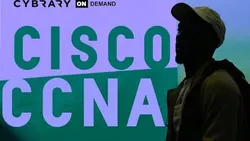
CCNA Campus & Ethernet troubleshooting: Cisco CCNA Exam Prep 
This comprehensive course provides the necessary knowledge and skills to prepare for the Campus Ethernet topics in the Cisco CCNA 200-301 exam. Students will gain an understanding of Ethernet and its related technologies to help them succeed on the exam. ▼
ADVERTISEMENT
Course Feature
![]() Cost:
Cost:
Free
![]() Provider:
Provider:
Udemy
![]() Certificate:
Certificate:
No Information
![]() Language:
Language:
English
![]() Start Date:
Start Date:
On-Demand
Course Overview
❗The content presented here is sourced directly from Udemy platform. For comprehensive course details, including enrollment information, simply click on the 'Go to class' link on our website.
Updated in [March 06th, 2023]
This course provides an overview of the topics related to troubleshooting Campus Networks for the Cisco CCNA Exam. Students will learn about the ARP protocol, layer 3 switching, SVIs, routed ports, and more. They will also review multiple Ethernet troubleshooting scenarios and learn how to fix Campus Network issues. By the end of the course, students will have a better understanding of how to troubleshoot Ethernet networks and be better prepared for the CCNA exam.
[Applications]
After completing this course, students will be able to apply their knowledge of Ethernet troubleshooting to the CCNA 200-301 exam. They will be able to identify and troubleshoot issues related to ARP, MAC address learning, Ethernet frames, layer 3 switching, SVIs, routed ports, and more. Additionally, they will be able to explain the differences between ip-default gateway and ip default route. With this knowledge, students will be better prepared to pass the CCNA 200-301 exam.
[Career Paths]
The three job position paths recommended for learners of this course are:
1. Network Engineer: Network engineers are responsible for designing, implementing, and maintaining computer networks. They must be knowledgeable in a variety of networking technologies, such as Ethernet, TCP/IP, and routing protocols. Network engineers must also be able to troubleshoot network issues and identify and resolve problems. The demand for network engineers is increasing as businesses rely more heavily on technology and the need for secure and reliable networks.
2. Network Administrator: Network administrators are responsible for the day-to-day operations of a computer network. They must be knowledgeable in a variety of networking technologies, such as Ethernet, TCP/IP, and routing protocols. Network administrators must also be able to troubleshoot network issues and identify and resolve problems. The demand for network administrators is increasing as businesses rely more heavily on technology and the need for secure and reliable networks.
3. Network Security Engineer: Network security engineers are responsible for designing, implementing, and maintaining secure computer networks. They must be knowledgeable in a variety of networking technologies, such as Ethernet, TCP/IP, and routing protocols. Network security engineers must also be able to troubleshoot network issues and identify and resolve security issues. The demand for network security engineers is increasing as businesses rely more heavily on technology and the need for secure and reliable networks.
[Education Paths]
Recommended Degree Paths:
1. Bachelor of Science in Computer Networking: This degree program provides students with the knowledge and skills needed to design, implement, and manage computer networks. Students learn about network protocols, network security, network architecture, and network troubleshooting. This degree program is ideal for those interested in pursuing a career in network engineering, network administration, or network security.
2. Master of Science in Network Security: This degree program focuses on the security of computer networks. Students learn about network security protocols, network security architecture, and network security management. This degree program is ideal for those interested in pursuing a career in network security, network engineering, or network administration.
3. Master of Science in Network Engineering: This degree program focuses on the design and implementation of computer networks. Students learn about network protocols, network architecture, and network troubleshooting. This degree program is ideal for those interested in pursuing a career in network engineering, network administration, or network security.
4. Doctor of Philosophy in Networking: This degree program focuses on advanced topics in computer networking. Students learn about network protocols, network architecture, network security, and network troubleshooting. This degree program is ideal for those interested in pursuing a career in network engineering, network administration, or network security.
Developing Trends:
1. Network Automation: Network automation is becoming increasingly important as networks become more complex and require more efficient management. Network automation tools allow network administrators to automate tasks such as network configuration, network monitoring, and network troubleshooting.
2. Network Virtualization: Network virtualization is becoming increasingly important as networks become more complex and require more efficient management. Network virtualization allows network administrators to create virtual networks that can be managed and monitored more efficiently.
3. Network Security: Network security is becoming increasingly important as networks become more complex and require more secure management. Network security tools allow network administrators to protect networks from malicious attacks and unauthorized access.
Pros & Cons

Detailed explanations on troubleshooting.

Clear and comprehensive explanations.

Practical and applicable to realworld situations.

Straight forward explanation and steps.

Crystal clear expression.

Video could be slowed down.

Chronology of content not clear.
Course Provider

Provider Udemy's Stats at AZClass
CCNA Campus and Ethernet Troubleshooting This comprehensive course provides the knowledge and skills necessary to prepare for the topic of Campus Ethernet on the Cisco CCNA 200-301 exam. Students will learn about Ethernet and related technologies to help them succeed in the exam. In this course, you'll review several Ethernet troubleshooting scenarios and learn how to troubleshoot campus network issues. You'll also learn about the ARP protocol, layer 3 switching, SVI, routed ports, and more. So it's time to get ready for your CCNA exam!
Discussion and Reviews
0.0 (Based on 0 reviews)
Explore Similar Online Courses

Introduction to Ballroom Dancing

GACE Early Childhood Special Education General Curriculum (503) Prep

Python for Informatics: Exploring Information

Social Network Analysis

Introduction to Systematic Review and Meta-Analysis

The Analytics Edge

DCO042 - Python For Informatics

Causal Diagrams: Draw Your Assumptions Before Your Conclusions

Whole genome sequencing of bacterial genomes - tools and applications

CCNA (Cisco Certified Network Associate) Course

Packet Tracer labs for the CCNA 200-301 exam: Practical labs


Start your review of CCNA Campus & Ethernet troubleshooting: Cisco CCNA Exam Prep